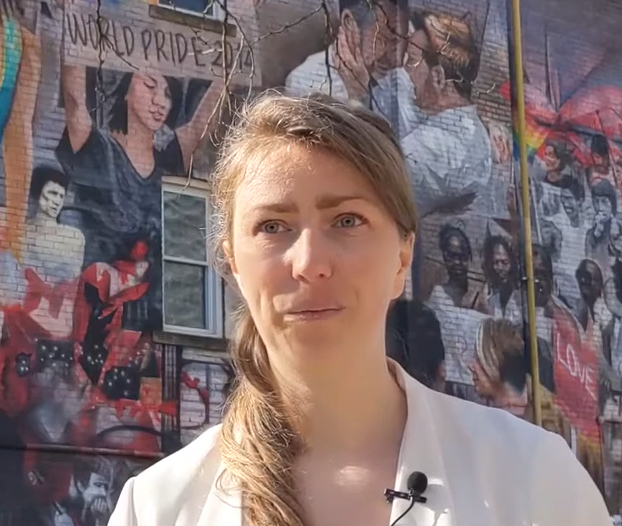Pride and Prejudice
© April 2023. Tanja Wagensohn UR. All rights reserved.
Gays, lesbians, bisexual, trans and queer persons are subject to harassment across the globe. Right-wing policy makers have successfully introduced anti-LGBTQ+ laws, thereby “protecting” their respective nations from “non-traditional values”. “It was due to such long and often continued criminalization and pathologization of LGBTQ+ expression that queer cultures represent one of the largest gaps in our uneven knowledge about the past”, says Tatiana Klepikova. In order to dispel the myth of “foreignness” of queer cultures to Eastern European societies, the early career scientist recently received more than 1.4 million euros funding from the Volkswagen Foundation.

Queer Creativity
When she visited Regensburg for the first time, she saw a rainbow flag on campus, noticed advertising of Queer-Streifen, Regensburg’s queer film festival. “It kind of becomes part of you. There is no researcher who can walk past an announcement somewhere in a city which concerns something even remotely related to their topic and not think ‘ha, interesting’. It happens to all of us.” Tatiana Klepikova is amused by the prejudice that Bavaria is intrinsically linked to conservativism. “People underestimate Bavaria”, she says, “it is not only Berlin that is queer, it is Munich, too”.
Originally, the researcher wanted to become a teacher. Born in 1989, she grew up in the crumbling Soviet Empire. While studying English and Spanish languages in her hometown of Yaroslavl, one of the historic cities of the “Golden Ring” northeast of Moscow, Tatiana worked as a tourist guide: “I was always interested in different cultures.” Subsequently, she decided to pursue a Master’s degree in Russian and East-Central European Studies at the University of Passau. Her next stops were in Toronto and Potsdam. At UR, Tatiana Klepikova has the chance to bring her expertise into interdisciplinary and area studies.
Light On!
Klepikova’s Freigeist Fellowship is providing her with the opportunity to establish and lead a research group at the University of Regensburg that looks at unknown and never officially published queer literature, written in private under Communist rule in socialist countries. Additional support for visiting postdocs has been provided by UR. In her project “Light on!”, Klepikova analyzes how and through which linguistic means queerness was represented in literary texts, how these texts were disseminated, in which contexts they occurred, and which boundaries they had to cross to reach readers. “It is the first multi-cultural study of underground queer creativity in Russia, Ukraine, Transcaucasian region, Poland, and the GDR, covering the 1940s to 1980s”, Klepikova says. The early career scientist is expanding literary approaches with methods from contemporary history, ethnography, cultural, and gender studies.
In Toronto, she still had the chance to visit the first LGBTQ-theatre in the world before COVID hit Canada and all public and cultural institutions shut down. Experiencing queer cultures and how they are embedded around the world “makes it easier for you to kind of place your own country in the world correctly. We are selling the progressive West and the regressive East when we talk about queer cultures”, Klepikova says. “But there are really rarely black-and-white stories.” In the 1910s, the first gay and lesbian novels were produced in Russia. In the 2020ies, some American states are still discussing possible bans of same sex marriage.
From Tchaikovsky to Pugacheva
Growing up as a heterosexual cis-gender girl in a structured normative environment, Tatiana Klepikova learned about misgendering or subconscious use of homophobic expressions only later in her life. As a child, she loved the singer Alla Pugacheva. When starting to explore queer culture, she found out that the lady in the flamboyant robes is one of the most famous gay icons in all of Eastern Europe, right up to today. There were more revelations. “Did you know Tchaikovsky was gay?” The researcher also works on queer Russian drama, from the years before the 1917 Revolution until today, seeking to challenge the widely held perception of Russian culture as an arena for exclusively heteronormative discourse. Recently, she compiled and translated an anthology of contemporary queer plays by Russian playwrights.
Tatiana Klepikova’s research subfield is small. 50+ people across the globe do research on this topic. Being part of such a small expert community is both an opportunity and a challenge. “You do not have to follow a dozen scientific journals every month”, she reflects, but “on the other hand, you also feel a bit intimidated if you enter such an unresearched area. There are huge spaces in which you literally can do anything. It is rather difficult for me to limit myself.” At the same time, she thinks strategically. “If there are no positions, you create them for yourself.”
Contemplating life outside academia, Tatiana concludes that “This profession is very hostile to one’s private life”. “You need 5, 7, or 10 years to find a long-term position and put yourself in a less stressful situation. It is the years in which one would start a family.”
How would she describe herself in one word? “I am a traveler”, Tatiana Klepikova says slightly wistfully. On the eve of starting the project, she trekked to the Everest in Nepal. The last time she visited Russia was in January 2022. While in Potsdam, she was among the volunteers welcoming Ukrainian refugees arriving at Berlin central station.

